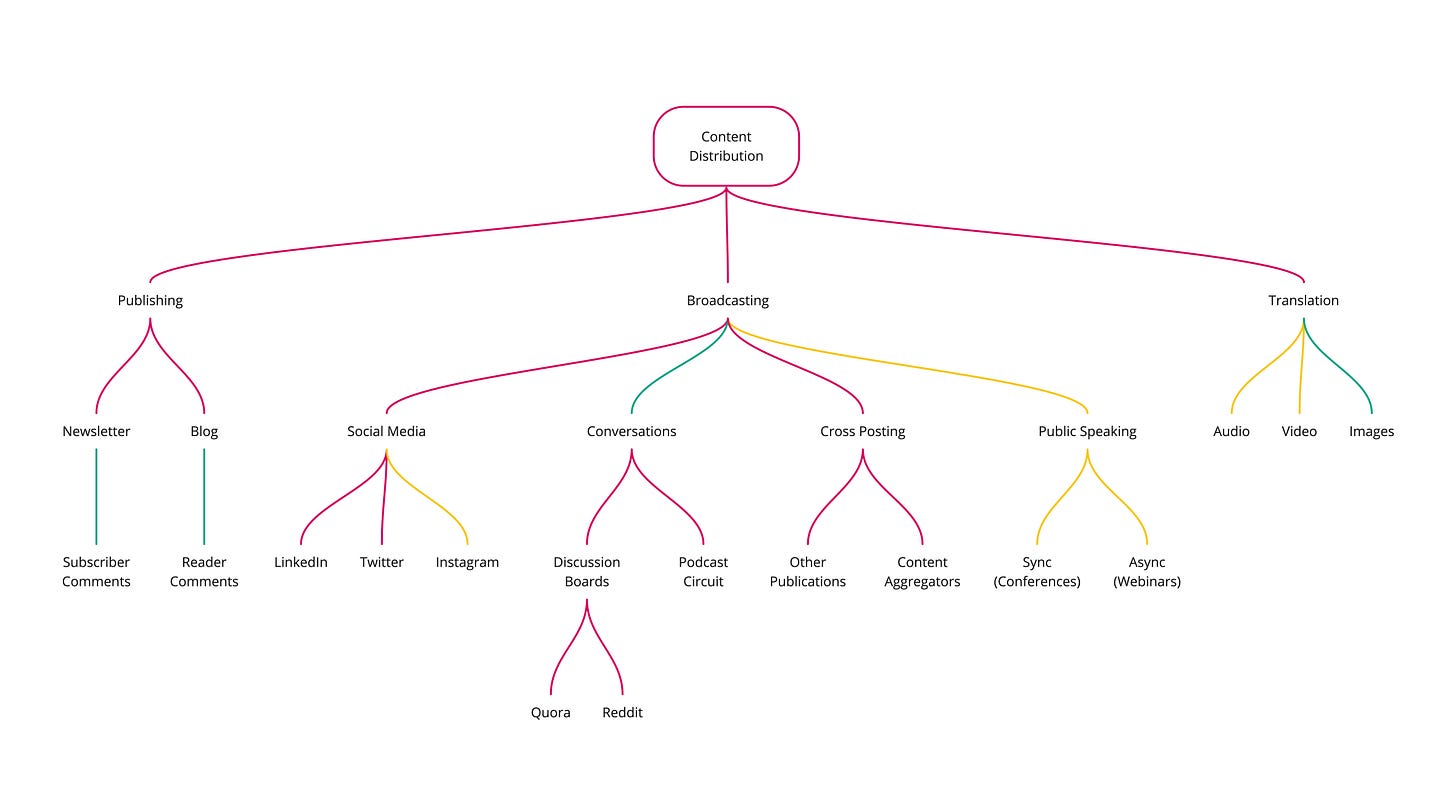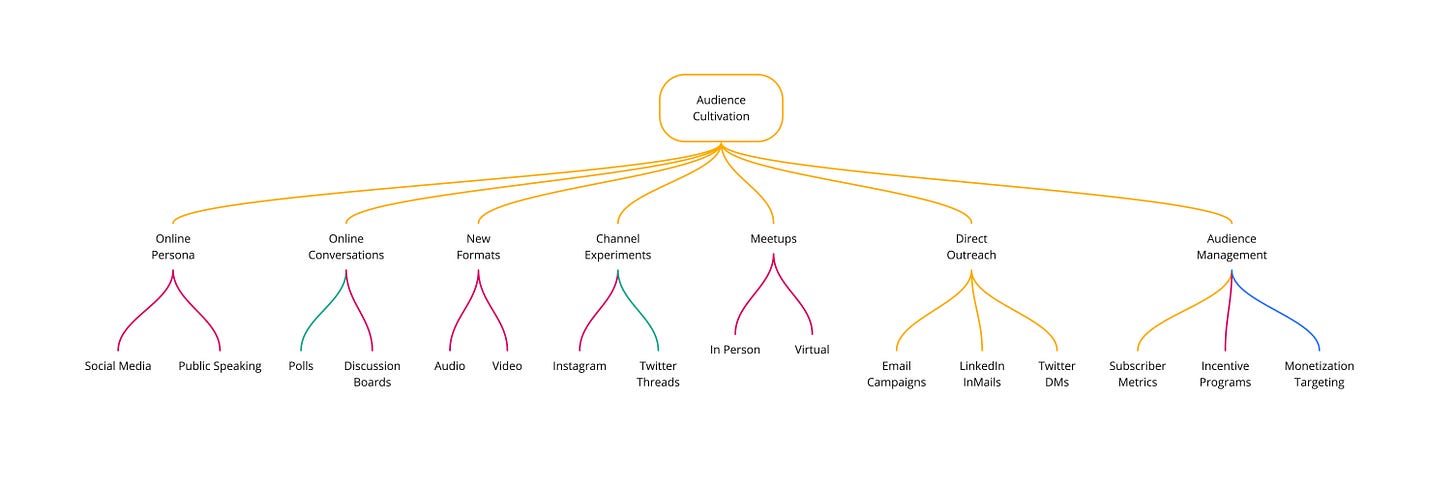I’ve been thinking recently about what I’m building with this newsletter. More and more, I find myself treating it like a product. So much so that I actually drew out the workflow I go through and how the flywheel operates.
There are fundamentally 2 major components:
It’s a bit chicken and egg, but basically new / engaging content leads to audience growth, and the growing audience feeds my backlog of content production.
But there’s slightly more nuance here:
When I’m focused on content, I’m either creating or distributing - and although I didn’t know it when I started, distribution is on equal fotting with creation. With regards to my audience, my primary near-term goal is cultivation with an eye towards future monetization.
Now, there’s nothing that unique about this workflow; I imagine most content businesses (individual book authors, newspaper holding companies, solo TikTok influencers, etc) have a similar flywheel.
But there are some points of divergence:
The content is not the product; it’s a path to building an audience, which will serve as the market for my eventual product - so many of the traditional rules about content businesses may be irrelevant
The scale of content production is very very small (a couple of posts a month, maybe 1-2 a week if I’m in peak writing mode) - the only ways to scale are full-time focus or a team, and while I’ve dabbled in collaboration, I don’t see how to maintain authenticity and quality if “scaling content” becomes the goal
Content distribution and audience cultivation are still evolving practices at such a small scale - independent writers don’t have access to the channels and budgets of media companies, they don’t have established business models to plug into, and in fact there are a ton of newsletters / websites around how to make it in "the creator economy” popping up…in short, I don’t think it’s figured out yet
It’s a bit meta, but I think the products that someone like me would need to do what I’m doing with less overhead / more success is where my mind keeps going - so I actually broke out the flywheel above into the workflow components
A few takeaways to note:
The colors indicate where one branch leads to another node - for example, I can be in content creation mode, writing a preview of an upcoming post, and that is a segue into distribution mode
There are a lot of different tools and channels I’m always jumping back and forth between, and while Substack has collapsed of lot of point solutions into 1, there is plenty that happens off-Substack (especially on the distribution front)
My north star metric is essentially “size of actionable audience”, but it’s still unclear what action I want that audience to take - the monetization paths that seem to be work for most creators (paywalls, sponsorships) don’t fit my ethos, and the ones that have materialized (teaching, consulting) are really hard to do repeatably
Because I’m trying to apply product thinking to this endeavor, I spent some time thinking about the worklow gaps / friction I face right now:
note: the clear clouds are the problems and the grayed in clouds are the solutions
I write based on mood, but I think some way to “time” posts based on my current reading / prior notes / zeitgeist trends would be great
The entire distribution flow pre- and post- publishing is quite a lot of work - every platform (LinkedIn, Twitter) has its own optimized formatting / timing, and while I know there are solutions for scheduling, I think real engagement engagement with the part of the audience that participates in your learning is hard amidst the noise
The cross-platform analysis of how an actionable audience is growing and when to do something about is doesn’t exists - Substack telling me which subscribers are 5 stars vs 1 star is kind of useless - the magic questions I’m looking for answers to are “who would come to a meetup?” “who would spend the time co-writing with me?” “who would build a microSaaS solution to this problem?”
As someone who consumes a lot of content, I find myself going down rabbit holes and reading blogs / watching YouTube videos / listening to podcasts on a niche topic - I feel like 1 of my blog posts can easily be stretched into different mediums across different channels, but right now that’s me tl;dr-ing and dabbling in new formats - I don’t know if a tool for this exists, but I think that’s going to be a critical part of the future content creator tech stack
I find getting “conversion” (i.e. subscription) works best in the moment (i.e. right after you like by Twitter thread you get a DM highlighting that I have a newsletter) - but that is really hard to keep up with and is ripe for automation
I know this was a bit of a meandering post, but I’m trying to balance my dual desires to build products and create knowledge, and my current thinking is there’s an audience overlap there. Time will tell…
As always, I’d also love to hear from readers on what they’re building and creating - please chime in via comments👇. And if you enjoyed this post, please consider subscribing.
further reading / references
it’s interesting to see product companies buying media companies - this whole post was me trying to figure out if a content empire can lead to a product idea
many of the product ideas I brainstormed above would probably be features in the de facto creator economy platform (still TBD who emerges), but as I’ve discussed before, innovation happens at the feature level
I’ve written previously about how Writing is Thinking, Creating, Connecting, Compounding, Manifesting, and Iterating
childish drawing / interpretation












I have some similar thoughts. Tried various things including podcast, newsletter (still have it) and blogging (still do), besides Twitter and Linkedin. Content distribution doesn't really work. And eventually I found what I want: writing more is the fun part. These days, I'm also thinking to write every day but publish when I have something valuable and good and distribute across different platforms according to their own strategies. This might work but it's totally against the strategy (and recommendations) of learning writing and getting feedback (by publishing). Think Derek Sivers or David Perell. I know they write every day but not publish regularly. My survivorship bias may be talking here but there are also tons of other people on the other end of spectrum.
This resonates a lot, we're in similar shoes.